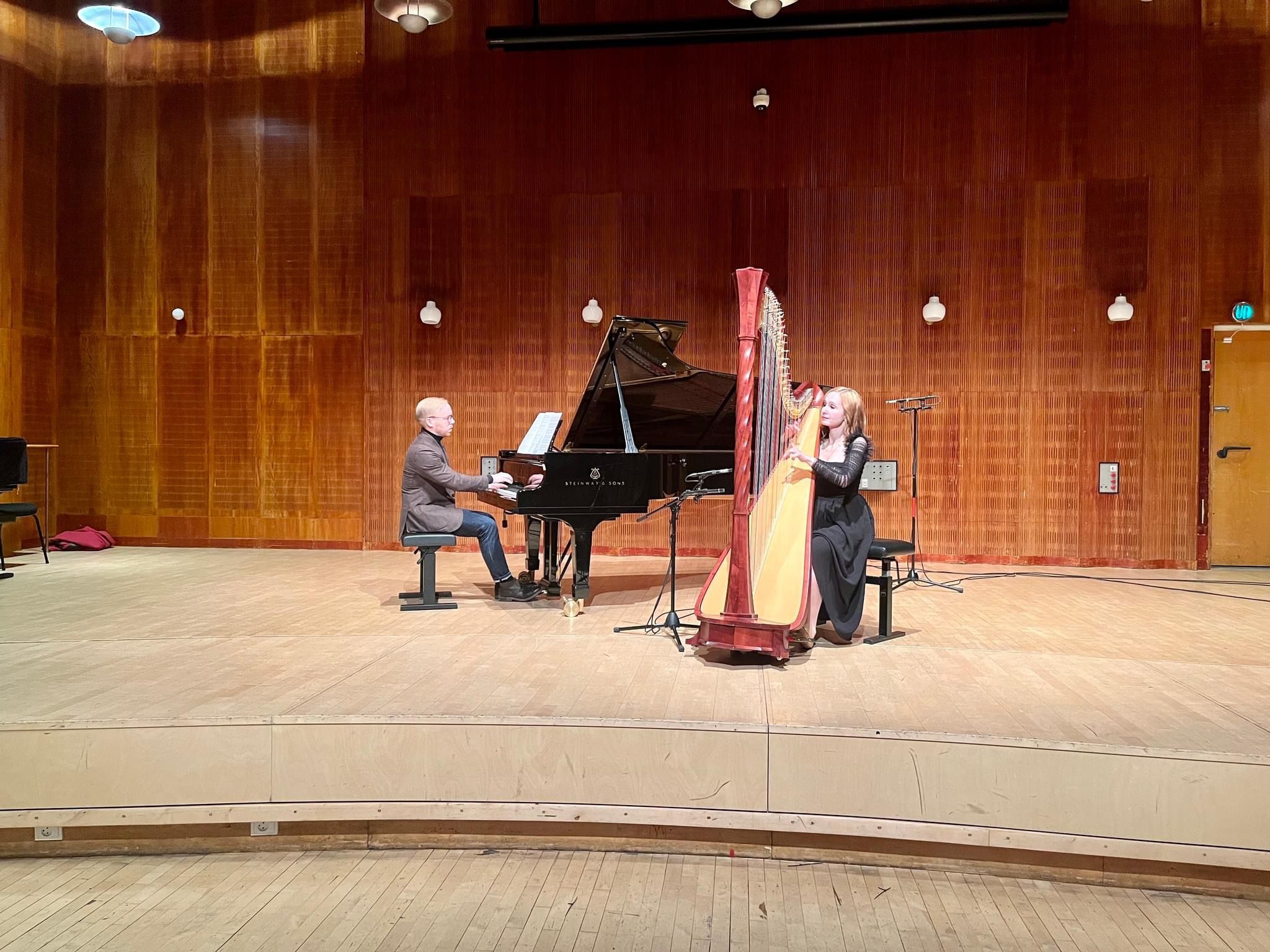Tanja Achilles is a professional solo harpist from Moscow, educated at the Tchaikovsky Conservatory. She pursued her music studies in Copenhagen with a postgraduate advanced course for soloists.
I settled in Denmark because… I married a Dane. I never thought about moving here before. I haven’t even been here or to any other Scandinavian countries before.
If you ask me if it was love at first sight or not I would say… It was not. I needed to get used to it. November was quite a lot nicer than in Moscow, because it was lighter. I know everyone is always complaining about the dark but in comparison to my city, it is sunnier.
When you move to a different country, you search for similarities but it’s a different world and people behave differently. Also, I missed my family a lot; it was hard to not see them that often. But then my husband brought me to the Conservatory, he wanted to show me where the musicians are in Copenhagen. It felt like home because musicians are the same everywhere. It became my little country in the country.
My favourite thing about living in Copenhagen is… that it is not that big. I think we don’t like big cities when we are born in one. And I like to not feel stressed in the street.
I have been to Paris and I love this beautiful city, but it was so stressful. You feel like you always need to be careful while here it is safer.
The most interesting thing about living in Copenhagen is… the journey to discover a European professional music environment. I also went to other European Schools and it is different. It is a good way to develop as a musician. It was interesting and challenging for me. I learned a lot from my teacher before she resigned and moved to Germany. It was a great experience because I was always working as a soloist so she taught me something new.
And my favourite observation about the Danes is… they think they are always right. And, even when they know they aren’t, they will make some changes without confessing their mistake. But at the end of the day, they really help each other. They really stick to each other in their private life and in their workplace.
Also, they don’t like scandals or any kind of conflict, so they try to avoid it in any possible way. And for my musician friends, I think they are hard workers. I know in other fields they work a lot from home but in music, after rehearsal, they are used to going to concerts and operas – even in Germany.
Danes love to have hobbies and when they work in an artistic field, all their life is that hobby. But despite this, they still have a work-life balance. When the orchestra’s conductor says it is time to have a break everyone stops playing. So, it is a very demanding job but also interesting and cool.
Here in Copenhagen I never get used to… not protesting any more. I am someone who loves to protest and to say when something is not right or needs to be improved. Here people like things the way they are.
Jeg kan tale... Jeg har ikke et fuldtidsjob, men jeg arbejder freelance og i orkestre. Jeg fik min kandidatgrad i Moskva, og jeg spillede som solist ved sommerkoncerter på Danmarks Radio.
I am in module 4 now, so it is getting more serious. It is good to start to speak and feel the improvement.
On an integration scale of 1 to 10 I would say I’m a… 6, even if I am a member of Danish music society because I still have a lot of things to do.
Maybe when I finish my Danish school and have other jobs in the music business, in a conservatory or something, I will feel more integrated. I would like to pursue some education in Danish as well when I am more advanced in the language.
I have more Danish friends in my social circle because… I work with many Danish musicians – is more a national field; my best friend is Danish and my husband’s friends are mostly Danish. But I have also international friends from France.
I think the best way of making Danish friends is… to be born here. Otherwise, it will never be the same. You can get close friends but not understand fully their culture.
If I should recommend a visitor to Copenhagen then I would tell them to visit… Statens Museum for Kunst and also all the castles in Denmark. I would recommend travelling around the country and not only in Copenhagen. For example, Ribe is very charming. It is the oldest town in Denmark. I went there to play once at a festival and I fell in love with the town. I would also recommend seeing Aarhus and going to art galleries.
Three great food and drinks spots are… The restaurant Grøften in Tivoli and Schønnemann, for Danish traditional cuisine. And for drinks, I like Villa Vino. It is a bit Frenchie and it is right next to Grand Teatret – a cinema with a coffee shop that I also recommend.
The best places to visit on a budget are… I recommend Early Bird. It is not a place but an app where you can find restaurants that offer some dishes, cheaper. You just have to look at the menus on the app and you can try different kinds of food. It is a nice experience.
The three words that I think best describe Copenhagen are… small, cosy and colourful. It is a city full of fashion, young people and joy.













